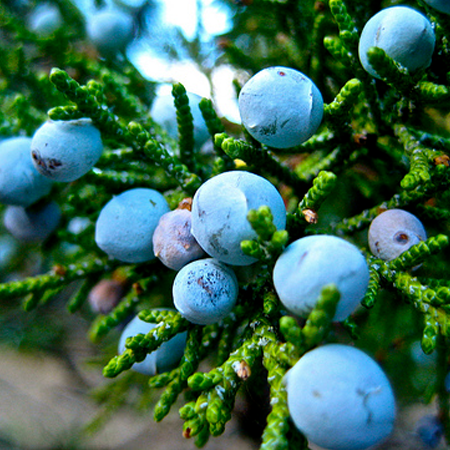

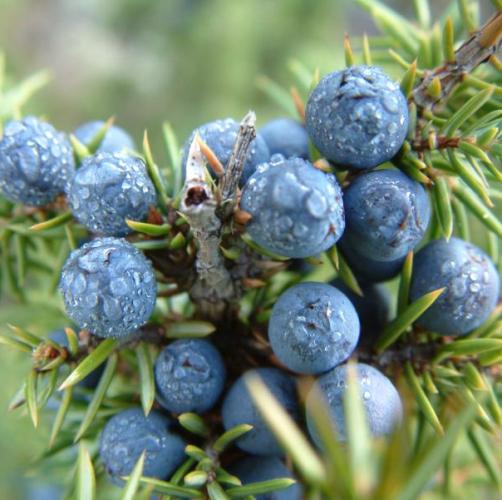
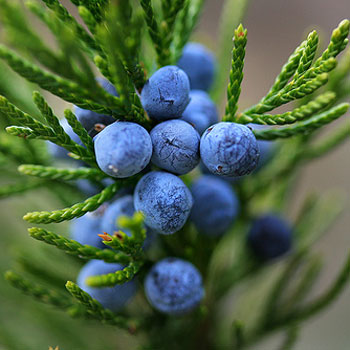
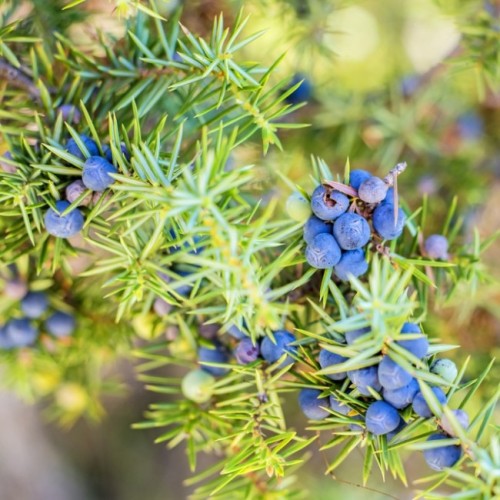
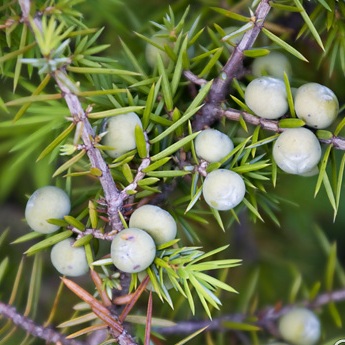
Botanical name Juniperus communis L
Family Cupressaceae
Source Berries
Origin Bulgaria
Processing Method Steam Distillation
Color/Consistency A thin, from colorless to yellow or pale green
Aromatic Summary / Note / Strength of Aroma A middle note with a medium aroma, Juniper Berry has a fresh, rich, balsamic scent reminiscent of pine needles.
Blends With Eucalyptus, Chamomile, Rosemary, Marjoram, Geranium, Bergamot, Sandalwood and Clary sage.
Product Abstract
Juniper berries are a spice used in a wide variety of culinary dishes and best known for the primary flavor. Juniper is a coniferous evergreen shrub that belongs to the pine family and is commonly found on heaths and mountains in Europe, North America, and Southwest Asia. Juniper berries Known as a powerful detoxifier and immune system booster. Juniper berries themselves are high in flavonoid and polyphenol antioxidants that have strong free radical scavenging abilities. It is high in flavonoids and antioxidants so it fights against free radical damage.
History
Juniper berries, including Juniperus phoenicea and junipers oxycedrus have been found in ancient Egyptian tombs at multiple sites. J. oxycedrus is not known to grow in Egypt, and neither is juniperus excelsa, which was found along with J. oxycedrus in the tomb of tutankhamun.The berries imported into Egypt may have come from Greece; the Greeks record using juniper berries as a medicine long before mentioning their use in food.
Harvesting/Extraction Information
The berries are green when young, and mature to a purple-black color over about 18 months. The berries are plucked from the branches of the plant once a year, and dried and ground before distillation. They have traditionally been used as an aromatic aid to meditation, and had remedial applications.
Common Usage
Caution
It should be avoided during pregnancy and by those who have kidney problems, and it should always be used in low concentrations.
Key constituents
a-Pinene 24.1–55.4%
Sabinene 0–28.8%
b-Myrcene 0–22.0%
Terpinen-4-ol 1.5–17.0%
(þ)-Limonene 0–10.9%
b-Pinene 2.1–6.0%
g-Terpinene 0–5.8%
d-3-Carene 0–3.0%
a-Terpinene 0–2.6%
b-Caryophyllene 1.3–2.2%
p-Cymene 0–2.0%
Terpinolene 0–1.9%
a-Thujene 0–1.8%
a-Terpineol 0–1.6%
Quality Common adulterants of juniperberry oil include the oil from fermented fruits, juniper wood and twig oil, turpentine oil and terpene hydrocarbon fractions. In one comparative analysis, 15 minor constituents, present in a lab-distilled oil at between 0.1 and 1.0%, were not detected in a commercial oil.
Safety summary
Hazards Skin sensitization if oxidized.
Cautions Old or oxidized oils should be avoided. Our safety advice Because of its high a-pinene content we recommend that oxidation of juniperberry oil is avoided by storage in a dark, airtight container in a refrigerator. The addition of an antioxidant to preparations containing it is recommended.
Regulatory guidelines
Has GRAS status. A warning about kidney irritation appears in the Expanded Commission E Monographs: ‘excessive use of juniperberry oil] may cause kidney irritation and damage because terpinen-4-ol has demonstrated irritant activities’
Organ-specific effects
Adverse skin reactions Undiluted juniperberry oil was moderately irritating to rabbits, but was not irritating to mice orpigs. A patch test using undiluted juniperberry oil for 24 hours produced positive reactions in 2/20 volunteers tested. When tested at 8% on 25 volunteers it was neither irritating nor sensitizing. It is non-phototoxic.
Nephrotoxicity We found no evidence to support the Commission E Monographs statement about kidney irritation. Blumenthal et al references two other books, which in turn reference other books, but we could find no definitive source for this warning. However, we did find evidence of a lack of nephrotoxicity.
Reproductive toxicity Several sources have flagged juniperberry as being contraindicated in both pregnancy and kidney disease. A vigorous attempt was made to trace the source of these contraindications.
Systemic effects
Acute toxicity Juniperberry oil acute oral LD50 in rats reported as 8.0 g/kg and as >5 g/kg; acute dermal LD50 in rabbits >5 g/kg.
Antioxidant/pro-oxidant activity Juniperberry oil showed moderate antioxidant activity as a DPPH radical scavenger and in the aldehyde/carboxylic acid assay.
Carcinogenic/anticarcinogenic potential No information found. (þ)-Limonene displays anticarcinogenic activity.
Comments
We believe that there is no reason to regard juniperberry oil as being hazardous. There are two likely reasons why juniperberry oil acquired a ‘tainted’ reputation, which has since been quoted and re-quoted. Firstly, there has been some confusion between juniper and savin. One research paper, published in 1928, has the sub-heading: ‘Emmenagog e Oils. In the body of the text it later states: ‘The popular idea has always been that pennyroyal, tansy, savin and other oils produce abortion. It is obvious that savin and juniper have been confused. This could explain why juniperberry oil was considered dangerous in pregnancy, since savin oil certainly is so. Secondly, if juniper berries are abortifacient, and if the component responsible for this is unknown, then suspicion could naturally fall on the essential oil. Gin has a reputation as an abortifacient, but again juniperberry oil is very unlikely to be responsible for any such effects, since the average maximum concentration of juniperberry oil in alcoholic beverages is only 0.006%. Most commercial juniperberry oil is a by-product of gin manufacture, and is derived from fermented fruits; this oil is not very aromatic.